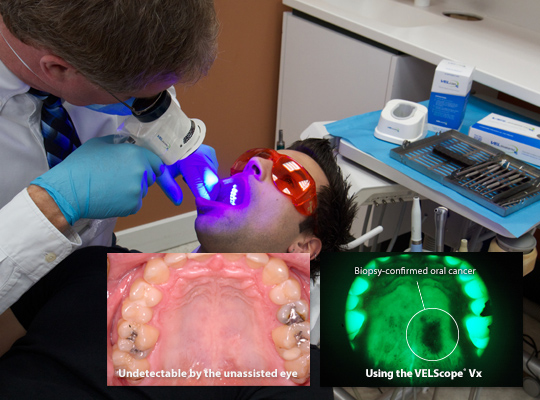
Oral cancer screening
Your Mouth Can Hide a Secret…
That’s why we use VELscope Vx.
Dr. Rabinovich provides complimentary oral cancer screening for every patient during an office visit.
The VELscope Vx is the two minutes exam that may help save your life.
How many little sores do we find in our mouths? Dozens? Hundreds? More? Most of the time we ignore them and they simply go away. But sometimes our mouths keep secrets. That’s why we use VELscope Vx Enhanced Oral Assessment system. The VELscope Vx helps us identify oral disease early, while it’s still easy to treat and to help locate areas that might, if not treated, progress to oral cancer.
The VELscope Vx helps us:
- to improve our assessment of your overall oral health;
- to ensure that the delicate tissues of your mouth are healthy;
- to protect you from oral disease, including oral cancer.
The VELscope’s blue light stimulates natural fluorescence in the soft tissues of your mouth. Natural fluorescence, seen through the VELscope Vx, allows dental professionals to see disease not visible with the naked eye or under ordinary light.

Risk Factors
Factors you can control
1. Tobacco use. In all its forms, tobacco is a major contributor to the development of oral or mouth cancers. Not using tobacco is the single most important thing you can do to avoid oral cancers.
2. Excessive alcohol consumption. More than 15 alcoholic beverages per week may put you at greater risk. If you drink, do so in moderation.
3. The combined use of tobacco and alcohol. This significantly increases the risk of oral cancer more than either by itself.
4. Excessive unprotected exposure to sun. Unprotected exposure to sun will increase the likelihood of lip cancers. Use at least SPF 30 sunblock on your lips.
5. Low intake of fruits and vegetables. A diet that does not contain the protective nutrients of these foods increases the risk of developing a variety of illnesses including oral cancer.
6. Use of betel nut and bedis. When chewed or smoked, these are causative agents of mouth cancers. Avoid their use. Risk factors not in your control or in which control is limited
Risk factors not in your control or in which control is limited
1. Age. Older individuals tend to develop more disease in general, including oral cancer, as their immune system becomes less efficient.
2. HPV16 viral infection. Increasing numbers of young, non-smoking individuals are being diagnosed with oral cancer. The causative factor is persistent HPV16 viral infection, the same virus responsible for more than 95% of all cervical cancer. While testing for the virus at the time of cervical examinations and PAP smears is becoming more common, individuals carrying this virus are not likely to know that they have it, as there are no outward symptoms. Currently there are no preventative or avoidance measures that will prevent sexual transmission of this virus.
However, limiting the number of sexual partners decreases your risk of contracting the virus.
3. Race, ethnicity, and economics. There are socio-economic factors that influence the development of cancers in different groups of people. For instance, while not related to biology, african-americans are diagnosed with oral cancer 2 to 1 over other races. In addition, people who live in areas with poor access to healthcare, or for economic reasons do not routinely visit a dentist or doctor, are also at
increased risk.
4. Recurrence. Previous head and neck cancer patients have a higher risk of a cancer recurrence which may occur in the mouth or other areas of the aero-digestive tract.
5. Gender. Statistically males get oral cancer more often than females. Again, this is not related to biology but lifestyle issues.
